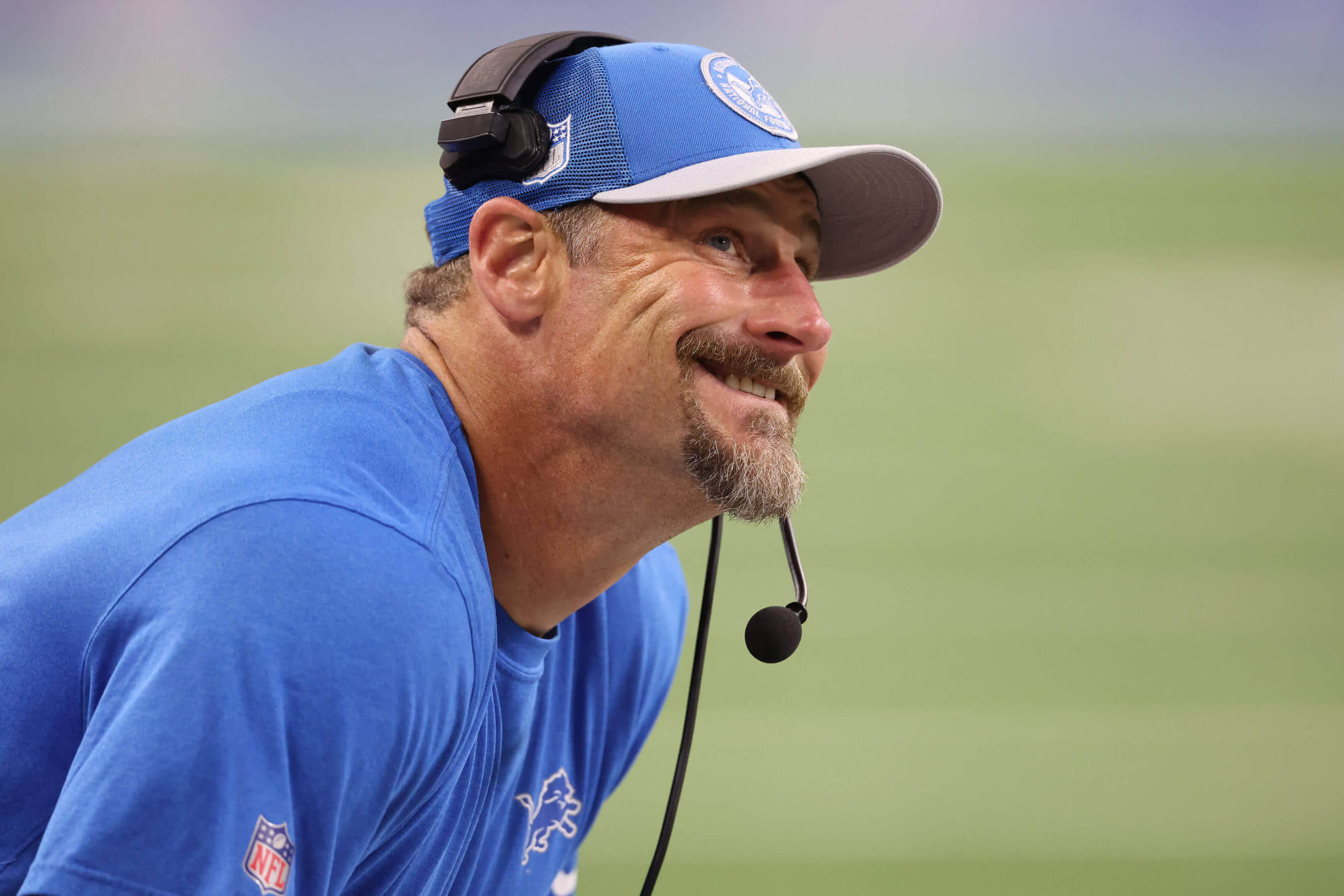
Editor’s Note: This story is a part of Peak, The Athletic’s new desk covering leadership, personal development and success through the lens of sports. Peak aims to connect readers to ideas they can implement in their own personal and professional lives. Follow Peak here.
One Sunday last season, Detroit Lions coach Dan Campbell paced the locker room, a smile on his face, adrenaline flowing, his audience waiting for one of the most dramatic moments of any NFL weekend: A Dan Campbell speech.
Advertisement
“You guys look like you remember who the f— you are,” Campbell yelled, his growly voice rising over cheers.
In this era of ubiquitous cameras, the NFL postgame locker room speech has never been more visible. And nobody, it seems, has mastered the art quite like Campbell, a 49-year-old Texan with the hulking build of a former tight end, the vocal cadences of Hulk Hogan and an abiding love of strong coffee and unflavored tobacco.
His speeches feature tales of death and survival, resilience and grit, growth and vulnerability. They often end with game balls passed out and tears shed. They have been at the heart of a cultural transformation, helping the Lions become one of the NFL’s top teams. And like clockwork, almost all have gone viral.
“I think the No. 1 thing that I think about with him is his emotional intelligence,” Lions quarterback Jared Goff told reporters last season. “How well he can read the room.”
To better understand Campbell’s gift, I analyzed many of his publicly available talks, consulting with speech experts, academics and some of his former players. The point wasn’t to be all high-minded and stuffy but rather to see what we could learn from Campbell’s speeches and style.
After all, what is a locker room speech if not a high-stakes public speaking engagement, where the goal is to communicate a message effectively and inspire an audience?
Believe it or not, Campbell’s speeches have all the hallmarks of Aristotle’s theory of classical rhetoric, said James Holtje, an adjunct professor at Columbia University’s School of International & Public Affairs, who teaches speechwriting and public speaking. There are elements of pathos (or emotion), logos (data) and kairos (timing), and there is a physical performance aspect that calls to mind a one-man show.
“He does exactly what I teach my students,” Holtje said. “Treat your speech like a performance.”
Advertisement
But it’s not just the physicality that lifts the presentation, said Patrick Barry, a clinical assistant professor of law at the University of Michigan, whose research focuses on creativity, persuasion and team dynamics. There are also language choices that focus on identity and echo what researchers commonly call a “growth mindset,” a concept popularized by American psychologist Carol Dweck.
For most of four seasons, Campbell has punctuated victories with a common phrase: “This is what great teams do.” It’s a construction, Barry says, that is more powerful than saying ”We’re a great team” because it implies not just a belief but an active embodiment of an ideal.
“He has managed to create in the Lions a sense of, ‘This is who we are,’ ” Barry said.
Perhaps that’s also the secret of Campbell’s speeches.
In every situation, he seems to know who he is.
When I emailed Holtje at Columbia in early January, asking if he could analyze and evaluate Campbell’s locker room speeches, he only had one concern: He was a soccer fan, he said, and didn’t know much about football.
Perfect, I said. His thoughts on the speeches wouldn’t be tainted. I sent him five video clips.
Two days later, he emailed back.
“OK, I looked at the videos,” he wrote. “Damn, he’s good.”
One of the speeches I sent was from training camp in 2022. It aired on HBO’s “Hard Knocks,” when Campbell was still known as the coach who had talked about biting kneecaps in his first press conference the year before. The Lions had won just three games in Campbell’s first year, and as he stood before his players in a big auditorium, he pointed at a wall decorated with the word “GRIT” and began a long monologue that imagined the Lions as an upstart combatant in battle royale in a dangerous oceanic abyss.
“You just got to get a hold of them, though!” Campbell said. “If you can just get a hold of them, and you start dragging their ass to the deep, dark abyss, you can drown ‘em.
“And that’s what we gotta be, that’s who we have to be, because that’s our domain. That is our domain. Because we’ll tread water as long as it takes to f—— bury you.”
Like most Campbell speeches, it was passionate, mesmerizing and a little unhinged. To Holtje, though, it was filled with elements he teaches his students: eye contact, vocal projection, emotion, storytelling and a slew of rhetorical flourishes, including alliteration, the rule of three, and the power of the particular.
Advertisement
“He uses nice metaphors that help explain his point in a way that I like to call simple, but not simplistic,” Holtje said.
Campbell intuitively understands rhetorical repetition. He knows when to pause for dramatic effect. He can deliver a punchline, then curl his lips into a sly smile. “I’m just telling you right now,” he said after a breakthrough win in 2022, “I’m gonna drink some beer tonight.”
When the Lions destroyed the Jaguars 52-6 in November, Campbell stalked the center of the locker room and made a show of his long list of notes. “Defense,” he yelled. “Gave up 170 yards! A hundred and seventy yards!”
When the Lions clinched a playoff spot against the Packers after an aggressive fourth-down decision in early December, Campbell paused only when he noticed offensive tackle Dan Skipper crouched on the ground.
“There you go, Skip!” he shouted. “Keep throwing up!”
If there’s a through line in every Campbell speech, it’s about emphasizing identity: who the Lions are now and what they do. According to Barry, it’s reminiscent of a leadership technique most commonly seen in advice given to parents.
“It’s the difference between saying: ‘Don’t lie’ and ‘We’re not liars,’ ” said Barry, the assistant professor at Michigan. “Saying ‘Don’t lie’ is saying ‘Don’t do that thing in this one particular instance.’ But if you say: ‘We’re not a family that lies, we’re generous people,’ that gives your kids, and in Campbell’s case his players, a way to think about how they’re going to approach the next 3rd-and-13.”
A similar example can be found in the book “Switch: How to Change Things When Change Is Hard,” authored by Chip and Dan Heath. The book tells the story of Crystal Jones, an elementary school teacher in a low-performing school who sets an ambitious goal for her first-grade class. By the end of the school year, she tells her class, they are going to be working at a third-grade level. To aid in the project, Jones stops referring to the children as “students” and starts calling them “scholars.”
“It’s not as if Dan Campbell calls the players scholars,” Barry said. “But he imbues them with a kind of respect and says: ‘This is what great teams do, and this is what we do.’”

Dan Campbell combines his passion, physicality and classic rhetoric to deliver locker room speeches that usually go viral. (Photo: Gregory Shamus / Getty Images)
Campbell has always relished telling stories. When he was the tight ends coach for the Miami Dolphins, he was often leading a film session when the mood struck. Moments later, he would pause the film, stop the session and turn toward the Dolphins’ tight ends.
Alright, I got a story.
“Those stories were a little bit like his speeches now,” said Jake Stoneburner, a former Dolphins tight end. “Usually it would be some good throwback story from his playing days, college days, drinking days, dippin’ days … and somehow it’s football related.”
Advertisement
Where the impulse comes from is a little harder to pace. Campbell grew up on a cattle ranch in a small town in central Texas. He played football at Texas A&M. When he was young, he has said, he didn’t always feel like a natural leader who could stand up and own a room. It felt more instinctual.
“Something would come up and things would bubble inside of me,” he said. “I could feel the heat on the back of my neck. It’s (like), ‘Say something, say something, say something.’ And I think that’s where it began.”
When Campbell retired from the NFL in 2009, he took a short-lived volunteer role at Texas A&M before landing with the Dolphins. In his early years as an assistant coach, he rarely addressed the whole team. But his players could sense a rare mix of ferocity and sensitivity.
One day at practice, on a 100-degree afternoon, Stoneburner was dealing with cramps in both legs. This wasn’t unusual. Like his tight ends coach, Stoneburner burned hot and sweated a lot. So during practice, Campbell pulled Stoneburner aside. He didn’t care how it looked. He just needed him to grind.
“I’m about to fall over and he goes: ‘Stoney, I just need one more play out of you! One more effing play! Do the play, throw up and you can go walk to the locker room!’” Stoneburner recalled.
“It was an awful play. I’m cramping. I fall to my knees. He goes: ‘Stoney, get out of here. Love you, brother!’”
When Campbell became the Dolphins’ interim coach for 12 games in 2015, his players got a glimpse of his language skills. But it was the stories in the tight end meetings that felt truly authentic. Campbell would wind himself up and the stories would unspool. When he was done, he would often apologize.
Sorry, I just needed to get that off my chest.
“It almost made him more human,” Stoneburner said. “Not just some coach where all we talk about is football. You knew who Dan was because he was being vulnerable to you. This big-ass Texas guy with a dip in and a coffee was sitting in a meeting and being vulnerable.”
Advertisement
That’s important, Holtje said. “You have to appeal to the head and the heart.”
Campbell has never stopped, and the result of his vision can be seen all across Detroit. Once upon a time, the Lions were an NFL laughingstock, winless, hopeless, a conveyor belt of coaches. On that Sunday, they were division champions for the second straight year.
“What we’ve done is not easy,” Campbell told his team “It’s not easy. But I’m telling you what, man, we’ve said it all along: We got a special group, man, and this has been comin’ a long time.”
The moment had what all Campbell speeches seem to possess: It felt authentic.
“There’s a sense he’s so sincere and earnest and that can be really powerful,” Barry said.
Moments later, Campbell was screaming again. His players were locked in.
When Stoneburner woke up the next morning, he popped open X, saw the video on his timeline and smiled. He retired in 2017 and hasn’t played football since, but he still keeps a copy of his own Campbell video on his phone.
It came after his first career touchdown, when Campbell was so excited he couldn’t contain himself on the sideline. Stoneburner still watches it at least twice a year.
That is Dan Campbell.
“I’ve never had someone besides family be such in my corner and so excited for a player just to make a play,” Stoneburner said. “It felt so genuine. It’s kind of making me choke up thinking about it.”
Rustin Dodd is a senior writer for Peak, The Athletic’s new desk covering leadership, personal development and success. He last wrote about the benefits of the “quiet eye” in golf. Follow Peak here.
(Illustration: Eamonn Dalton / The Athletic; Photo: Nic Antaya / Getty Images)
This news was originally published on this post .











Be the first to leave a comment